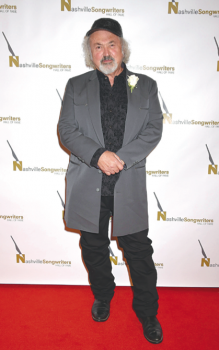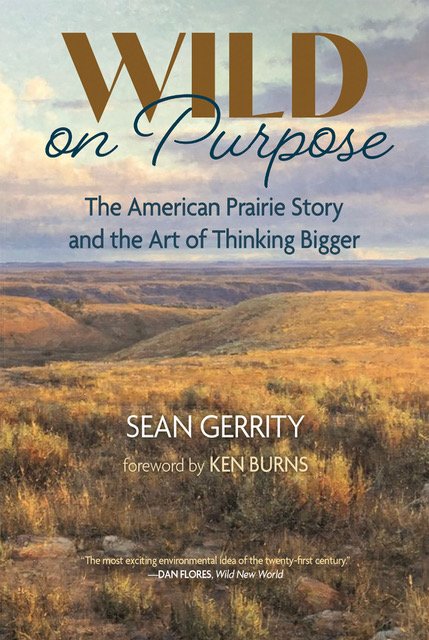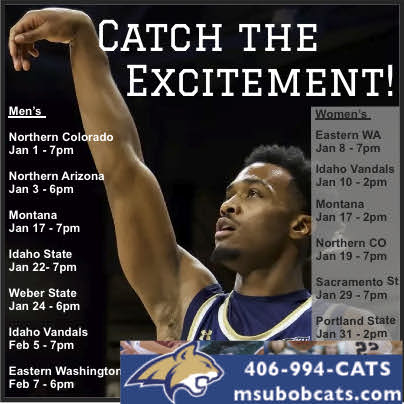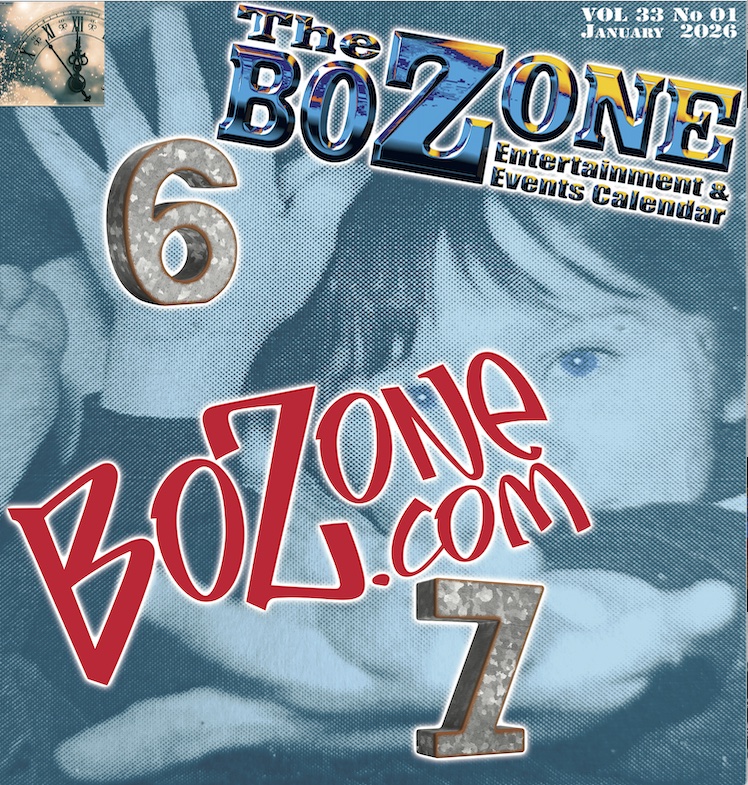Belgrade’s Kostas inducted into Nashville Songwriters Hall of Fame
by Skip Anderson
Through one lens, it may appear singer/songwriter Kostas became an overnight success in 1989. After all, then-emerging artist Patty Loveless took his first two cuts ever recorded in Nashville to the top two spots of the Billboard Country charts. Through another lens, Kostas had certainly paid his dues by that time, having toured for over two decades as a singer/songwriter before producer and country music kingmaker Tony Brown (Brooks & Dunn, Vince Gill, Lyle Lovett, Reba McEntire, George Strait, Marty Stuart, among dozens of others) discovered him.
This fall, Kostas was inducted into the Nashville Songwriters Hall of Fame – an honor arguably overdue, given the string of hits he penned for A-list country artists primarily in the 1980s and ’90s, including the Dixie Chicks, the Mavericks, Martina McBride, Jo Dee Messina, Marty Stuart, Travis Tritt and Dwight Yoakam.
Despite his meteoric success as a songwriter, Kostas has always considered himself a performer first and foremost and a songwriter second. Now 70, his voice continues to carry a Roy Orbison sweetness, and his songwriting continues to be masterful.
On a recent snowy Sunday in his Belgrade home, Kostas picked up a well-worn Martin nylon-string guitar and performed a song he only recently finished, “You Don’t Know the Moon.” It’s an unhurried love song that’s both optimistic and pleading. And it’s backed by a melody that lingers – all qualities songwriters can spend entire careers chasing. Kostas makes it look easy.
Kostas: I was approaching 40 when I met Tony Brown, and not getting any younger. And music, for the most part, belongs to the youthful. I had no outlet for my music, and I had no place to go with the music except to play in the bars around Montana. When Tony Brown called and invited me to come to Nashville, I said, sure, I’ll come down to see what Nashville is all about. He introduced me to the people at Welk Music, and I signed a publishing deal with them. The deal I signed with Welk could have happened with any other publisher in Nashville. But Tony Brown introduced me to them first.
Rolling Zone: At this stage, you had been on the road regionally for quite a while. Had you been able to set aside a little money?
Kostas: Nope. I was as broke as the sky is blue.
RZ: Did that change when you signed with Welk?
Kostas: Well, I had a steady income right off the get go. And the very first song that got recorded in Nashville [“Timber, I’m Falling in Love”] became a No. 1 song for Patty Loveless. She also had on that same album my song, “The Lonely Side of Love,” which hit No. 2 on the charts. Then, on the heels of that, Marty Stuart and I wrote a bunch of songs. He had just gotten his deal with MCA [Records] and one of those songs, “Don’t Leave Her Lonely Too Long,” became a single. So, I came out of the gate running real hard.

photo by Tammie Arroyo
RZ: Were you surprised by your success at that time?
Kostas: I was. But I also had this energy in me that told me I knew what I was doing – I knew who I was and I knew what was in me to do musically. And the songs that I was writing came out as natural as songs can come out. The one thing they didn’t see in me down in Nashville was that I was a performer, too. You know, these were my songs that other people were recording. But I never got the recognition as an artist.
RZ: So, in your view, you’re not a songwriter getting songs cut by artists. You’re an artist who writes songs that other artists cover.
Kostas: You could say that. I was known for being a songwriter of my own songs and as an artist in and around Montana. And playing in the bars was my outlet for 20 years. I didn’t have a label up here or any supporting crew to take care of the bookings, publicity, and management of my career – I had to do all those things myself, just like all the youngsters who are performing around here today. Becoming a country songwriter was an offshoot of that. But in my mind, I was always the artist than I am.
RZ: How old were you when you dropped out of school?
Kostas: I was 17 or 18 years old. I wasn’t interested in school; it just wasn’t part of my DNA. I didn’t want to hang around being a part of something I wasn’t a part of. And also, earlier in that summer of ’67, I got beat up by a couple of young thugs one fine July day. That beating resulted in a detached retina in my left eye. I had three eye operations in September, and by the time I got out of the hospital, half the school year had already passed. I figured I was going to flunk anyway, so I got my GED certificate and moved on. Besides, I was interested in making up melodies and playing my guitar. From that time on, I was in and out of bands – sometimes as a sideman and sometimes in my own groups that I started. Those years from ’67 forward left a powerful influence on my hunger. I heard melodies in my head all the time back then, and I hear them all the time now – nothing’s changed. And I was always welcome in the bars with my guitar, and so that’s what I ended up doing – I played with different bands and hit a road. My parents had divorced, so I’d come back home every now and then and sometimes help support my mom and sometimes she would help support me.
RZ: Do you remember the first song you wrote?
Kostas: Yeah, I had just had a bad acid trip and I wrote a song about it. It was called “Mato Man.” I thought I was dying of a heart attack. Forty or 50 years later I found out that was a common occurrence [laughs]. Hippies were popping up around Billings and everybody’s hair was getting long, and girls were, you know, going around letting them bounce and everybody was trying to smoke ragweed and trying different drugs – you know, mescaline, psychedelics, and cocaine. Back in those days, you had those kids that walked a straight line, and those like me who got into everything they could. The straight kids would go to dances where the music was being provided by the kids that were indulging in the other side of that equation. If I had the opportunity to go back and do that differently, I don’t think I’d get involved in all that. By the same token, it showed me what not to get involved in the psychedelics.
RZ: Sure.
Kostas: This scene in the 1960s was being fed by the music coming out of Hollywood, Muscle Shoals, Detroit, New York, and some came out of Philly, and some came out of Tennessee and Nashville.
RZ: Absent from that list is Montana, both then and now.
Kostas: Yes. But with the exception of Chan Romero, who is from Billings. Chan, as you know, wrote and performed “Hippy, Hippy, Shake.” He was one of the connecting dots that created rock history. Little Richard was coming up with “Lucille,” and “Hippy Hippy Shake” follows that same groove with similar stops in it. Even the Beatles performed that song in their early years.
RZ: We have a lot of homegrown musical talent – Sean Devine, Montana Rose, and Tessy Lou Williams jump to my mind. I’d add an up and comer named Marcedes Carroll to that list, too. These are legit talents that might have a greater shot at a much wider audience if they were closer to the industry.
Kostas: Montana is now at the stage where the nourishment these new musical talents need to continue their [artistic] growth is here. And they could sit here for the rest of their lives being nourished and finding gigs in this environment and they will be local stars and be worshiped as such. Such was the case with Scott Tucker. And that might have been me, too, had I not gotten my deal down in Nashville. I mean, I easily could have ended up sitting around here playing forever and making friends along the way. But, in the end, you can get sucked into a black hole by just sitting here. Sooner or later, these kids today are going to have to make their move and find some connections by which they can find a wider audience if that’s their goal. Our job, as musicians, is to feed the beast – meaning the world – with our music. These kids need to come up with something that sets them apart from everybody else and expand their audience.
RZ: With Bozeman, Paradise Valley and Big Sky booming, the audience is getting bigger.
Kostas: That’s what our little valley has turned into.
RZ: Is that a good thing?
Kostas: I think that there’s been too much growth too quickly. Everything that you see around here that is new is new from 1995 forward. In my opinion, it all started with the movie Rancho Deluxe [a 1975 moving starring Jeff Bridges that was filmed in Paradise Valley]. It opened up the eyes of the world to what we have here. Once you build a road, that road’s going to get used. And the road was that movie and another one: A River Runs Through It.
RZ: I interviewed Jeff Bridges, a notable musician in his own right, about the music scene in Montana in 2016. The first word out of his mouth was “Kostas.” I know you two have performed together a time or two. How did you know him?
Kostas: [Laughs] Well, I was playing at the Wrangler bar in Livingston where the cast and crew of Rancho Deluxe were having their party to celebrate the end of filming. My girlfriend at that time was Susie Geston. She had just moved down from Missoula to Chico where she was working where I would sometime play at. That particular night, she came to watch my band play, and the bar is just packed and rip-roaring. And we were up there rocking along and making sure that they got the music to go along with all of that stuff. In walks Susie – she was beautiful, a petite little blond-haired girl from North Dakota whom I had met at the Top Hat in Missoula. She just had a glow about her, and everybody who saw her wanted to get close to her, and that’s exactly what happened – everybody was pulling her into their circles and buying her drinks. Well, the circle that won out of that event was the table that Jeff Bridges was sitting at. Song after song, she gets whisked off to dance – there’s stardust and magic all around her as she twirled and danced. She’s laughing and smiling and having fun and being swept around the dance floor mostly by Jeff. And I’m up there on stage watching all this play out, you know, like I was in some Italian opera where I’m the clown. [Kostas sings the famous line from “Pagliacci,” then laughs.] At the end of the night, I slipped out the back with my guitar, leaving Susie and Jeff to work things out.
RZ: That’s rough!
Kostas: Not at all. He and Susan have been married ever since and have three beautiful daughters together. We’re all good friends. In fact, she’s a photographer and took many of the photos that appear on self-titled album from 1978.
RZ: Their daughter Jessie Bridges is emerging as a singer songwriter, too.
Kostas: Really? Let me know when she’s playing out and I’ll meet you there.
RZ: You were in Tennessee recently for your induction into the Nashville Songwriters Hall of Fame.
Kostas: I was. It was nice. I mean, the town is full of songwriters, artists, and musicians of every kind. And I have, over the years, become friends with a lot of them. I enjoy their kindred spirits.
Skip Anderson is an award-winning music journalist based in Bozeman, Montana. •







